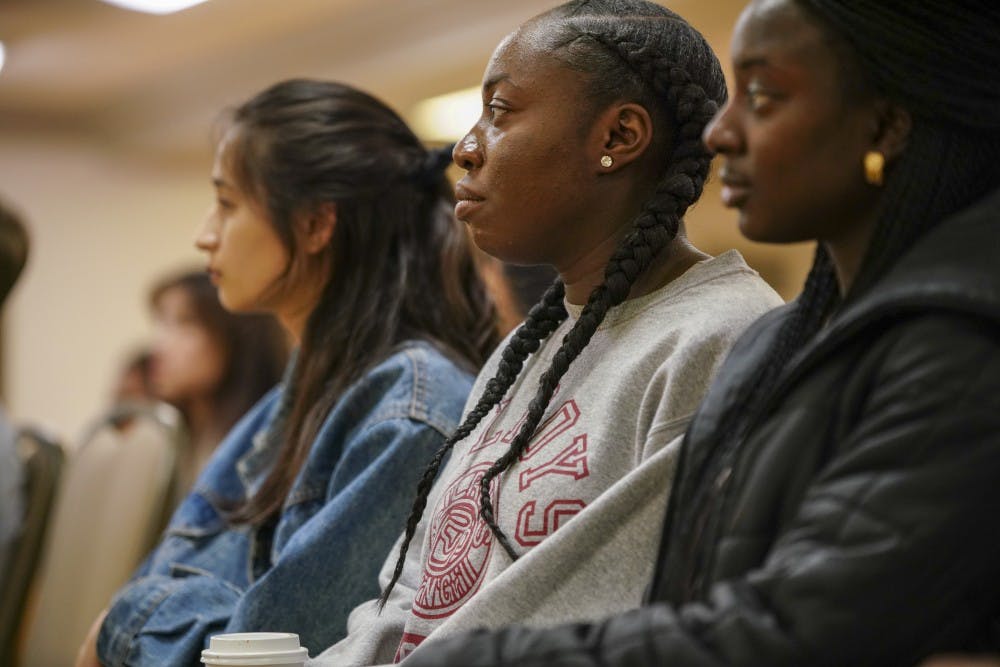Students who want to use their careers to improve access to health care must supplement their education by working with the marginalized communities they want to help, said Shelley Sallee, assistant director of Volunteers in Medicine.
“You’ve got to experience it,” Sallee said. “You’ve got to then take that information and get into the real world in situations that will make you uncomfortable.”
Sallee, along with IU sociology professor Elaine Hernandez and Forrest Gilmore, executive director for the Shalom Community Center, spoke Wednesday evening in the Indiana Memorial Union Georgian Room on a panel about how people with marginalized identities are affected by the world of health care.
The event was co-sponsored by UndocuHoosiers Bloomington and the Minority Association of Premedical Students.
All three panelists encouraged attendees to expand their education and volunteer experiences as much as possible to help marginalized groups. They talked about many different groups who might be affected by health care policies, including women, immigrants, substance abusers and people in poverty.
At the Volunteers in Medicine of Monroe County clinic, Sallee works with people who are uninsured or who have inadequate insurance to make sure they still have access to the care they need.
Even under the Healthy Indiana Plan, a state-level insurance tied to the Medicaid expansion, some patients are still not able to afford what they need, Sallee said.
She once worked with a man who was told he needed over a dozen teeth pulled before a surgery, but HIP would only cover a few of the extractions, she said. Because insurance wouldn’t provide the best level of care, a dentist from the clinic wound up working extra days to pull the man’s teeth.
Sallee said many people like face problems like this man did in health care that may go ignored by the overall system, Sallee said.
“They’re falling through the gaps like crazy, and the gaps seem to be wider as we go on,” Sallee said.
Gilmore said another marginalized sector of the population is substance abusers.
In the past, the Shalom Center dealt primarily with alcohol addiction, but this has changed to mostly opioid and synthetic drug-related problems in the past five or so years, Gilmore said.
Especially with synthetics, it’s impossible to know what is in the drugs.
“We’ve had people tested positive for rat poisoning,” Gilmore said.
Substance abusers are often treated as criminals instead of people with a medical problem, Gilmore said. Many are also fed the myth that they will hit rock bottom before seeking help, but rock bottom can look different for everyone and can still take years to bounce back from.
“You can’t go much lower than sleeping in a bush,” Gilmore said. “You could die. That's about the next level of going lower.”
Gilmore said he works with a housing program where participants don’t have to get sober in order to be eligible for housing, but he finds that almost all of them are able to maintain a home.
Instead of falling deeper into addiction after obtaining housing, satisfying basic needs actually gives people the ability to cut back and recover because they have the support that they need to get help, Gilmore said.
Hernandez said women face their own problems in the health care system, and maternal mortality has been a strong indicator of the issues they deal with.
Maternal mortality can help researchers understand overall health of a country's population. The United States has the highest maternal mortality rate of any developed nation, and it affects minority women more than the overall average.
Factors such as socioeconomic status and education level externally affect the care women receive, Hernandez said. After a lifetime of dealing with these struggles, they do not have the opportunities or resources to navigate the health field.
“They’re disadvantaged in so many ways,” Hernandez said.
On top of the problems women of color must deal with, Hernandez said immigrant women have faced other issues as well.
In the face of a “show me your papers” provision intended to fight undocumented immigration in Arizona, children of immigrant women had lower birth weight, Hernandez said. Although the bill hadn’t even passed, this was still a significant cause of stress for these women.
Sophomore Shahin Saberi, who serves as the diversity chair for MAPS, was one of the event moderators.
MAPS and UndocuHoosiers organized the panel to help bridge the gap between classroom education and the current state of the medical field, Saberi said. By listening to problems in the health care community, students are able to learn about issues they may not usually consider.
“I’ve found that the things we are trying to spread awareness about is not profession-specific,” Saberi said. “It relates to all people.”
Saberi said he plans to go into health care policy, and he specifically wants to use his career to help people who are invisible in the medical world.
He said medical professionals are already expected to be empathetic and caring toward their patients, but there should also be a push toward teaching these values to unite everyone to care for each other.
“We are the United States, after all,” Saberi said.




